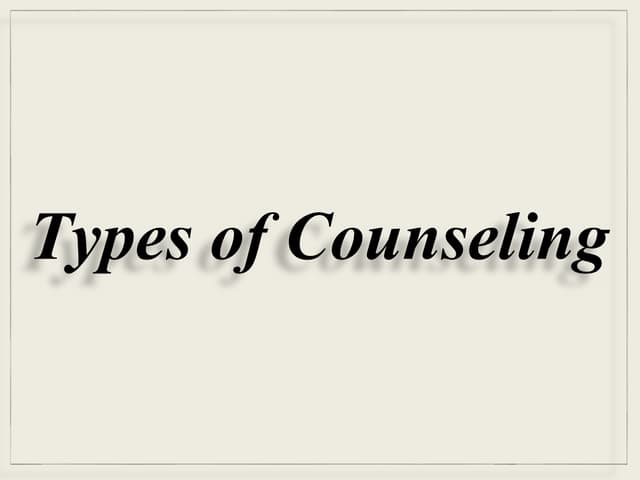A Comprehensive Guide to the Different Sorts Of Counselling and Their Impact
Counseling incorporates a selection of therapeutic methods, each created to fulfill unique mental health and wellness demands. From the organized techniques of Cognitive-Behavioral Therapy to the compassionate nature of Person-Centered Treatment, these methods supply distinct pathways to personal growth. Household therapy and Dialectical Habits Therapy offer added structures for recovery, while team therapy fosters community support. Understanding these diverse methods can brighten their extensive influence on private wellness. What stays to be checked out are the complexities of each technique.

Understanding Cognitive-Behavioral Therapy (CBT)
Although several therapeutic strategies exist, Cognitive-Behavioral Therapy (CBT) stands apart because of its organized, goal-oriented nature. This type of treatment is based upon the premise that thoughts, sensations, and actions are adjoined, and by changing unfavorable idea patterns, people can alter their emotional actions and activities. CBT uses various techniques, such as cognitive restructuring, which assists customers recognize and challenge distorted beliefs. Behavioral activation motivates involvement in satisfying activities to fight anxiety.
Normally, CBT is a temporary therapy, often long lasting between 12 to 20 sessions, making it obtainable for those looking for fast results. Its effectiveness has been well-documented in treating stress and anxiety conditions, anxiety, and other mental health and wellness problems. The therapist's role is to guide customers with exercises and homework projects, promoting self-awareness and promoting long-term coping strategies. This practical approach empowers people to take control of their psychological health, inevitably bring about boosted life satisfaction.
Discovering Person-Centered Therapy
Person-Centered Treatment, established by Carl Rogers, provides a contrasting approach to Cognitive-Behavioral Treatment by highlighting the client's subjective experience. This healing version focuses on the individual's perspective, cultivating a setting of empathy, unconditional favorable regard, and authenticity. By permitting clients to discover their sensations and thoughts without judgment, specialists assist in personal growth and self-discovery.
The core tenet of Person-Centered Treatment is the belief that individuals have the fundamental capacity for self-healing and individual development. In this setting, the therapist works as a helpful overview instead of a directive authority, urging clients to organize their very own journey. This strategy is especially efficient for those facing issues such as reduced self-esteem, anxiousness, or anxiety, as it encourages them to face and recognize their emotions. Inevitably, Person-Centered Therapy grows a strong healing alliance, promoting trust and visibility important for purposeful change.
The Function of Family Members Therapy in Recovery
Family members therapy offers as an essential part in the healing process for people and their relationships. This restorative strategy focuses on enhancing interaction, dealing with disputes, and cultivating deeper connections amongst member of the family. By dealing with useless characteristics, family treatment urges each member to express their ideas and sensations in a safe atmosphere, advertising understanding and compassion.

The effect of family therapy expands beyond the sessions, as enhanced relationships can cause enhanced emotional health for all involved. In general, family members therapy plays a crucial duty in healing by promoting unity, strength, and mutual assistance among family participants, inevitably directing them towards a much healthier, more satisfying life with each other.
Unboxing Dialectical Behavior Modification (DBT)
Building on the foundation of restorative approaches that improve psychological well-being, Dialectical Behavior modification (DBT) offers a structured framework for people dealing with intense emotions and behavioral difficulties. Created by Marsha Linehan, DBT incorporates cognitive-behavioral strategies with mindfulness methods, intending to aid clients manage overwhelming feelings and enhance discover this social efficiency.
The treatment is specifically beneficial for those diagnosed with Borderline Personality Condition however is likewise relevant to a variety of various other psychological wellness concerns. adhd counselling. DBT consists of private therapy sessions and skills training groups, concentrating on 4 vital ability sets: mindfulness, distress resistance, feeling guideline, and social efficiency
The Benefits of Group Counselling Sessions
While specific treatment supplies useful insights, group therapy sessions provide distinct benefits that can significantly enhance the healing experience. One vital advantage is the sense of area that arises among participants. People usually locate comfort in sharing their experiences with others encountering comparable challenges, cultivating an encouraging atmosphere that reduces sensations of seclusion.
Team sessions encourage varied point of views, allowing individuals to learn from each various other's coping strategies and insights. This cumulative wisdom can lead to improved problem-solving capacities and a broader understanding of individual issues.
In addition, group therapy typically advertises responsibility, as members inspire one an additional to pursue their objectives and abide by their dedications. The cost-effectiveness of team therapy makes it an easily accessible alternative for many individuals looking for assistance. In general, the joint nature of team counseling sessions can considerably enrich the restorative trip.
Often Asked Inquiries
What Qualifications Do Therapists Required to Exercise Therapy?
Therapists usually call for a relevant degree in psychology or counseling, in addition to supervised clinical experience. Additionally, they should acquire ideal licensure or certification to practice lawfully, making certain adherence to professional standards and honest guidelines.
Just how Do I Pick the Right Kind Of Treatment for Me?
Picking the ideal kind of treatment entails reviewing individual demands, exploring various methods, thinking about specialist specializeds, and looking for suggestions. Comprehending individual goals and choices can significantly improve the performance and satisfaction of the go now restorative experience.

Are Online Counseling Procedure as Effective as In-Person Ones?
The efficiency of online counseling sessions contrasted to in-person ones commonly depends upon individual preferences and conditions. Research study shows that review both techniques can yield positive outcomes, though some may locate greater comfort in face-to-face interactions.
Just How Long Does Therapy Commonly Last?

What Should I Expect Throughout My First Counseling Session?
During the first therapy session, clients can anticipate an introduction, conversation of their concerns, facility of goals, and a review of the therapy process - adhd counselling. This initial conference aims to develop relationship and assurance convenience